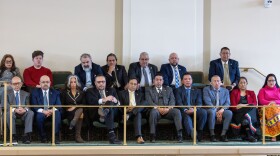The National Native American Boarding School Healing Coalition (NABS) is advocating for a deeper investigation into Indian boarding schools across the nation, especially from those institutions that have not released information publicly.
The Department of the Interior laid the foundation for understanding the lasting impacts in its Federal Indian Boarding School Initiative first and second volume reports, uncovering that 973 American Indian, Alaska Native and Native Hawaiian children died while, or shortly after, attending a federal boarding school.
This proposed legislation would build on the DOI’s work by investigating all boarding schools, both federally and privately run institutions.
Ben Barnes is the Chief of the Shawnee Tribe and sits on the NABS board. Barnes said the truth and healing commission is necessary to hold all the boarding schools accountable.
“How many of these kids were abused?” Barnes said. “How many of these kids never came home? So that's why the bills are important because the bills would give that truth-finding commission the power to receive those records and then prepare a report so that we can then do something.”
According to NABS, there are more than 520 identified Indian boarding schools in the U.S. to date. The DOI recorded 417 federal Indian boarding schools in 37 states in its second volume report. However, Barnes noted that the DOI report can only analyze records freely given to it or obtained through the Bureau of Indian Affairs or Bureau of Indian Education.
“The BIE and the BIA can't make private institutions pony up records for us to understand how much money was spent indoctrinating these kids so they would forget their communities and forget their languages, forget their religions,” Barnes said.
That’s why he said passing the legislation is imperative to gaining a more comprehensive picture of Indian boarding schools in the nation and the students' experiences there.
Sandy White Hawk (Sicangu Lakota) is the NABS elder-in-residence. Though not a boarding school survivor, she has spoken with many, including family members.
She recalled some horrific memories others shared with her.
“Here in Minneapolis, one time, I was conducting a meeting, and this one gentleman shared how his knees were bad his whole life because, as a young person, he had to kneel on a broomstick for long periods of time as a punishment,” she said.
She also said others had told her about sexual abuse they experienced at boarding schools, noting while these memories may be difficult to talk about or listen to, they are essential to be heard.
“It is essential that our children who were forced to attend these schools are not forgotten and that this assimilative era of U.S. Indian policy is acknowledged so that future generations may understand the impact that this trauma has had in their community,” said a statement from NABS. “Ultimately, we must know the truth so that we ensure that this never happens again.”
Barnes said uncovering what happened to his relatives at boarding schools is not an opportunity but an obligation.
If passed, the commission will publish a public report of their findings within five years and provide recommendations to further the healing process for those who attended Indian boarding schools and their affected family members.
This report was produced by the Oklahoma Public Media Exchange, a collaboration of public media organizations. Help support collaborative journalism by donating at the link at the top of this webpage.









